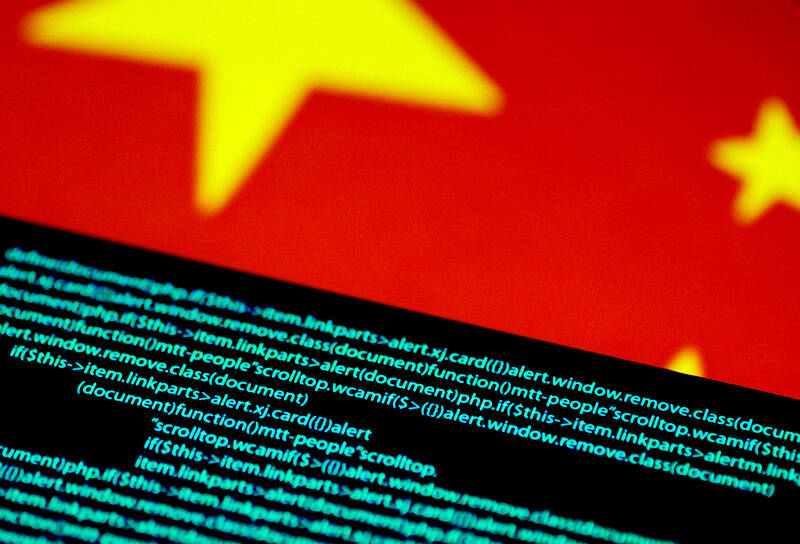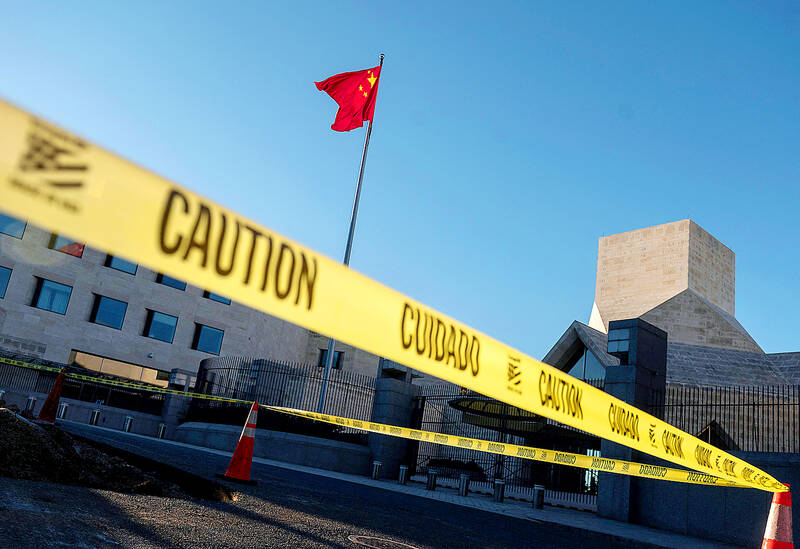Chinese hackers have allegedly tampered with widely used software distributed by a small Canadian customer service company, in what cybersecurity experts see as another example of a “supply chain compromise,” which was made infamous by the hack on US networking company SolarWinds.
US cybersecurity firm CrowdStrike said in a blog post that it had discovered malicious software being distributed by Vancouver-based Comm100, which provides customer service products, such as chat bots and social media management tools, to a range of clients around the globe.
The scope and scale of the hack was not immediately clear.

Photo: REUTERS
In a message, Comm100 said it on Thursday fixed its software and that more details would be forthcoming.
CrowdStrike researchers believe the malicious software was in circulation for a couple of days, but would not say how many companies had been affected, divulging only that “entities across a range of industries” were hit.
A person familiar with the matter said a dozen firms are known to be affected, although the actual figure could be much higher.

Photo: AFP
CrowdStrike's Senior VP of Intelligence Adam Meyers said that the hackers were suspected to be Chinese, citing their patterns of behavior, language in the code and that one affected firm had repeatedly been targeted by Chinese hackers in the past.
The Chinese government rejected the claim.
In an e-mail, Chinese embassy in the US spokesman Liu Pengyu (劉鵬宇) said officials in Beijing “firmly oppose and crack down on all forms of cyber hacking in accordance with the law” and that the US “has been loudly active in fabricating and spreading lies about so-called ‘Chinese hackers.’”

CHAOS: Iranians took to the streets playing celebratory music after reports of Khamenei’s death on Saturday, while mourners also gathered in Tehran yesterday Iranian Supreme Leader Ayatollah Ali Khamenei was killed in a major attack on Iran launched by Israel and the US, throwing the future of the Islamic republic into doubt and raising the risk of regional instability. Iranian state television and the state-run IRNA news agency announced the 86-year-old’s death early yesterday. US President Donald Trump said it gave Iranians their “greatest chance” to “take back” their country. The announcements came after a joint US and Israeli aerial bombardment that targeted Iranian military and governmental sites. Trump said the “heavy and pinpoint bombing” would continue through the week or as long

TRUST: The KMT said it respected the US’ timing and considerations, and hoped it would continue to honor its commitments to helping Taiwan bolster its defenses and deterrence US President Donald Trump is delaying a multibillion-dollar arms sale to Taiwan to ensure his visit to Beijing is successful, a New York Times report said. The weapons sales package has stalled in the US Department of State, the report said, citing US officials it did not identify. The White House has told agencies not to push forward ahead of Trump’s meeting with Chinese President Xi Jinping (習近平), it said. The two last month held a phone call to discuss trade and geopolitical flashpoints ahead of the summit. Xi raised the Taiwan issue and urged the US to handle arms sales to

BIG SPENDERS: Foreign investors bought the most Taiwan equities since 2005, signaling confidence that an AI boom would continue to benefit chipmakers Taiwan Semiconductor Manufacturing Co’s (TSMC, 台積電) market capitalization swelled to US$2 trillion for the first time following a 4.25 percent rally in its American depositary receipts (ADR) overnight, putting the world’s biggest contract chipmaker sixth on the list of the world’s biggest companies by market capitalization, just behind Amazon.com Inc. The site CompaniesMarketcap.com ranked TSMC ahead of Saudi Aramco and Meta Platforms Inc. The Taiwanese company’s ADRs on Tuesday surged to US$385.75 on the New York Stock Exchange, as strong demand for artificial intelligence (AI) applications led to chip supply constraints and boost revenue growth to record-breaking levels. Each TSMC ADR represents

Pro-democracy media tycoon Jimmy Lai’s (黎智英) fraud conviction and prison sentence were yesterday overturned by a Hong Kong court, in a surprise legal decision that comes soon after Lai was jailed for 20 years on a separate national security charge. Judges Jeremy Poon (潘兆初), Anthea Pang (彭寶琴) and Derek Pang (彭偉昌) said in the judgement that they allowed the appeal from Lai, and another defendant in the case, to proceed, as a lower court judge had “erred.” “The Court of Appeal gave them leave to appeal against their conviction, allowed their appeals, quashed the convictions and set aside the sentences,” the judges